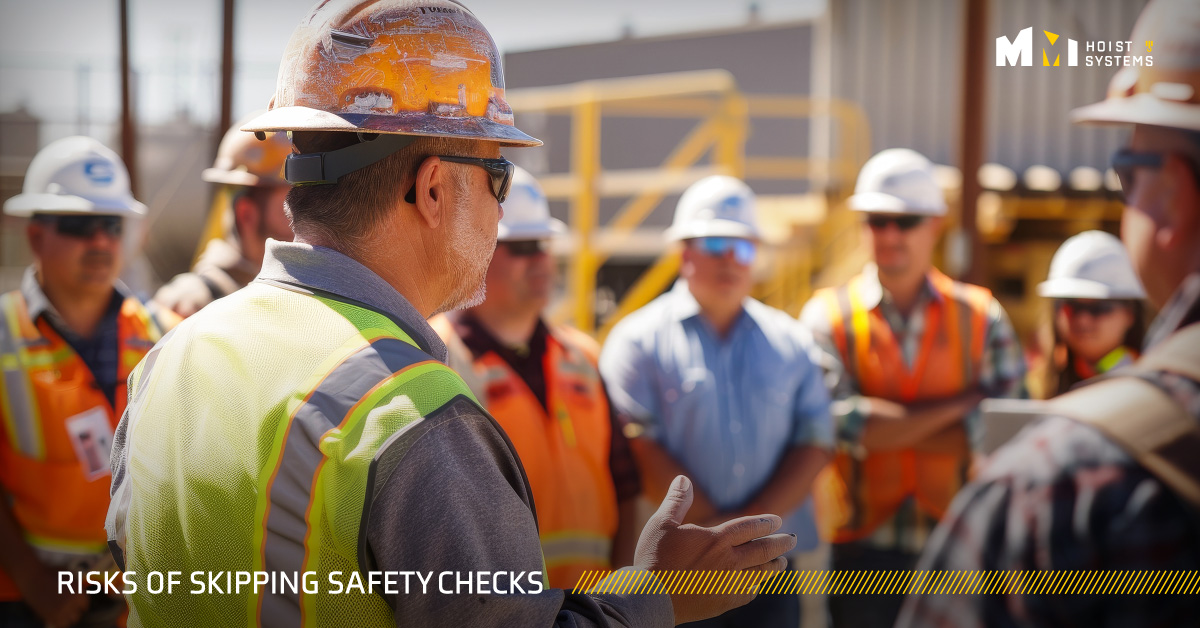Routine crane inspections are often viewed as a formality. But these inspections are not just a best practice—they’re a legal and operational necessity, providing you with a frontline defense against risk. Inspections play a critical role in protecting your people, your equipment, and your bottom line.
At MMI Hoist Systems, we’ve seen firsthand how regular inspections can help you prevent accidents, avoid penalties, and minimize downtime. Here’s why inspections matter and what risks you might be taking by skipping them.
Legal Requirements and Compliance
OSHA and ANSI regulations require both periodic and frequent inspections of cranes and hoists. Skipping these inspections, therefore, can expose your company to serious legal consequences. Noncompliance can result in citations, fines, or even work stoppages. Plus, if an incident does happen to occur, not having inspection records could significantly increase liability, or even lead to criminal charges.
Keeping up with required inspections demonstrates due diligence and helps create a verifiable, documented safety record. Ultimately, this could protect your organization from significant legal exposure.
Safety First: Protecting People and Property
Cranes and hoists are powerful, high-risk machines. When something goes wrong, the consequences can be catastrophic, including property damage, injuries, or fatalities. A worn brake, a cracked weld, faulty wiring, or a frayed wire rope may not be noticeable until it’s too late.
Routine inspections can help catch early signs of wear or malfunction, which helps prevent devastating failures. Additionally, prioritizing inspections helps promote a culture of safety, sending a signal that safety is always at the forefront of everything you do.
Financial Risk of Unplanned Downtime
Emergency breakdowns are typically more expensive than planned maintenance. Expediting replacement parts or scheduling after-hours services can add to the cost of repairs. Even worse, unexpected equipment failure can bring operations to a halt. This downtime can delay projects, impact client commitments, erode profitability, and damage your reputation.
When you catch issues early through routine inspection, you can plan ahead and perform maintenance during scheduled downtimes, working the whole process into your existing schedule and saving you time and money in the long run.
Reduced Equipment Lifespan
Cranes need to be inspected and maintained regularly in order to perform optimally. Small, fixable issues that go unnoticed can compound over time and lead to bigger problems, ultimately shortening the equipment’s useful lifespan.
Inspections may require some investment (from a time and financial perspective), but it’s an investment that helps preserve your capital assets. With proper care, you can avoid premature replacement costs and enjoy more reliable equipment performance for years to come.
Insurance and Documentation
Keeping inspection records on hand is definitely good practice, but it’s also often required by insurance carriers. In the event of a claim or investigation, up-to-date inspection reports can help validate that your company took reasonable precautions to mitigate risk.
Well-documented inspections also build trust and confidence with clients and stakeholders, who are able to see for themselves that safety is considered a top priority at your company.
Inspections Are Non-Negotiable
Routine crane inspections are not just a box to check—they’re a critical safeguard. The legal, safety, and financial risks of neglecting these inspections far outweigh the cost or time required to perform them.
At MMI Hoist Systems, we help our clients stay ahead of risks and practice responsible machine operations. Our inspection programs promote compliance, prevent downtime, and most importantly, keep people safe. For us, peace of mind begins with prevention.
Don’t risk the cost of skipping an inspection. Let MMI Hoist Systems help you meet requirements and enjoy safe, reliable operations—every day. Contact us today to get started.
